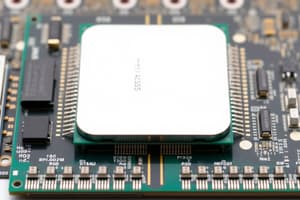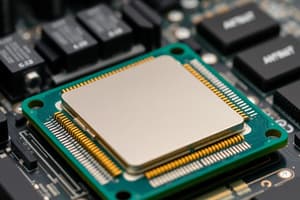Podcast
Questions and Answers
What is the main function of the Central Processing Unit (CPU) in a computer?
What is the main function of the Central Processing Unit (CPU) in a computer?
The CPU acts as the brain of the computer, executing instructions and processing data.
Explain the difference between a Hard Disk Drive (HDD) and a Solid State Drive (SSD).
Explain the difference between a Hard Disk Drive (HDD) and a Solid State Drive (SSD).
HDDs use magnetic storage with larger capacity and slower speeds, while SSDs use flash storage, offering faster access times but at a higher cost.
What role does the motherboard play in a computer system?
What role does the motherboard play in a computer system?
The motherboard houses essential components like the CPU and RAM and connects different parts of the computer.
How does Random Access Memory (RAM) impact a computer's performance?
How does Random Access Memory (RAM) impact a computer's performance?
What is the purpose of the Power Supply Unit (PSU) in a computer?
What is the purpose of the Power Supply Unit (PSU) in a computer?
Describe the function of a Graphics Processing Unit (GPU).
Describe the function of a Graphics Processing Unit (GPU).
What are cooling systems used for in computer hardware?
What are cooling systems used for in computer hardware?
What are input devices? Give two examples.
What are input devices? Give two examples.
What are expansion slots used for in a computer?
What are expansion slots used for in a computer?
Discuss one current trend in computer hardware.
Discuss one current trend in computer hardware.
Flashcards are hidden until you start studying
Study Notes
Computer Hardware
-
Definition: Physical components of a computer system that perform specific functions.
-
Main Components:
- Central Processing Unit (CPU):
- The brain of the computer that executes instructions.
- Measured in gigahertz (GHz); higher GHz indicates faster performance.
- Motherboard:
- Main circuit board housing the CPU, RAM, and other components.
- Connects different parts of the computer.
- Random Access Memory (RAM):
- Temporary storage used by the CPU to store data that is actively being used.
- More RAM allows for better multitasking.
- Storage Devices:
- Hard Disk Drive (HDD): Magnetic storage with larger capacity and slower speed.
- Solid State Drive (SSD): Flash storage, faster access times but typically more expensive.
- Power Supply Unit (PSU):
- Converts electrical power from an outlet to usable power for computer components.
- Graphics Processing Unit (GPU):
- Specialized processor for rendering graphics and visual effects.
- Critical for gaming and graphic design tasks.
- Cooling Systems:
- Essential for maintaining optimal operating temperatures.
- Includes fans and heat sinks to dissipate heat generated by components.
- Central Processing Unit (CPU):
-
Peripheral Devices:
- Input Devices:
- Devices that allow users to input data, e.g., keyboard, mouse, scanner.
- Output Devices:
- Devices that output data, e.g., monitors, printers, speakers.
- Storage Devices:
- External hard drives, USB flash drives, and optical drives (CD/DVD).
- Input Devices:
-
Types of Computer Hardware:
- Desktops: Fixed computers typically consisting of separate components.
- Laptops: Portable computers with integrated components.
- Servers: Powerful systems designed to manage network resources and data storage.
- Embedded Systems: Computers integrated into other devices, e.g., appliances, vehicles.
-
Expansion Slots and Ports:
- Expansion Slots: Allow additional cards (e.g., GPUs, sound cards) to be added.
- Ports: Connect external devices, e.g., USB, HDMI, Ethernet ports.
-
Trends in Computer Hardware:
- Miniaturization leading to more powerful, compact devices.
- Increased use of integrated components reducing space and power consumption.
- Rise of solid-state technology for storage solutions.
Computer Hardware Definition
- Physical components of a computer system performing specific functions.
Main Components
- Central Processing Unit (CPU)
- The "brain" of the computer; executes instructions.
- Measured in gigahertz (GHz), higher GHz indicates faster performance.
- Motherboard
- Main circuit board connecting the CPU, RAM, and other components.
- Random Access Memory (RAM)
- Temporary storage used by the CPU for actively used data.
- More RAM allows for better multitasking.
- Storage Devices
- Hard Disk Drive (HDD): Magnetic storage with larger capacity and slower speed than SSDs.
- Solid State Drive (SSD): Flash storage, faster access times but typically more expensive than HDDs.
- Power Supply Unit (PSU)
- Converts electrical power from an outlet to usable power for computer components.
- Graphics Processing Unit (GPU)
- Specialized processor for rendering visuals (graphics and effects).
- Critical for gaming and graphic design tasks.
- Cooling Systems
- Essential for maintaining optimal operating temperatures.
- Utilize fans and heat sinks to dissipate heat generated by components.
Peripheral Devices
- Input Devices
- Devices for inputting data. Examples: keyboard, mouse, scanner.
- Output Devices
- Devices for outputting data. Examples: monitors, printers, speakers.
- Storage Devices
- External hard drives, USB flash drives, and optical drives (CD/DVD).
Types of Computer Hardware
- Desktops: Fixed computers typically consisting of separate components.
- Laptops: Portable computers with integrated components.
- Servers: Powerful systems designed to manage network resources and data storage.
- Embedded Systems: Computers integrated into other devices, e.g., appliances, vehicles.
Expansion Slots and Ports
- Expansion Slots: Allow additional cards (e.g., GPUs, sound cards) to be added.
- Ports: Connect external devices, e.g., USB, HDMI, Ethernet ports.
Trends in Computer Hardware
- Miniaturization leading to more powerful, compact devices.
- Increased use of integrated components reducing space and power consumption.
- Rise of solid-state technology for storage solutions.
Studying That Suits You
Use AI to generate personalized quizzes and flashcards to suit your learning preferences.




